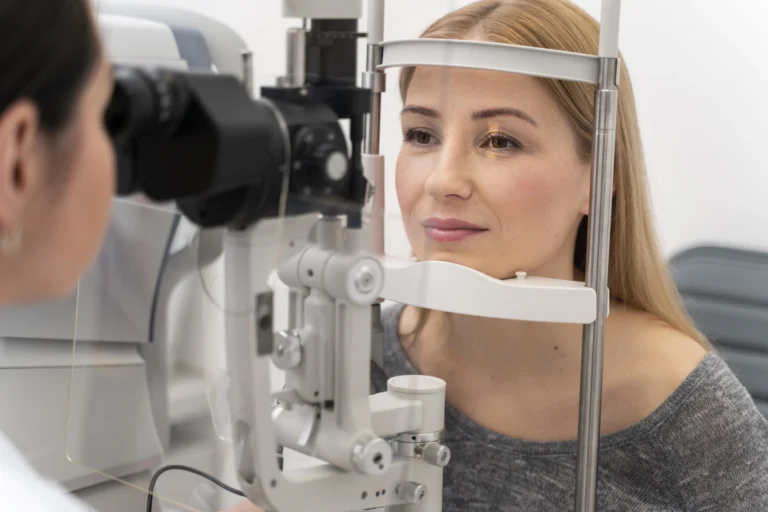Refractive eye surgery, commonly known as laser corrective eye procedure, is a transformative solution for people having vision problems. This surgical procedure corrects refractive errors by reshaping the cornea, which is the clear front surface of the eye. This correction allows the light to be properly focused onto the retina for better vision. Commonly, there are 3 vision problems that corrective eye surgery can fix. This simple procedure can help you see the world with a clearer vision.
Here are 3 common vision problems that can be effectively corrected with refractive eye surgery.
1. Myopia (Nearsightedness)
Myopia, or nearsightedness, is one of the most prevalent vision issues corrected by refractive eye surgery. In myopia, the axial length of the eye is longer than normal, or the cornea of your eye is overly curved, causing light to focus in front of the retina. This results in distant objects appearing blurry while close objects remain clear.
Laser corrective eye surgery procedures like LASIK (Laser-Assisted In Situ Keratomileusis) and PRK (Photorefractive Keratectomy), work by reshaping the cornea, flattening it to ensure light focuses directly on the retina. Many patients achieve 20/20 vision or better after refractive surgery, significantly reducing or eliminating their need for glasses or contact lenses.
Factors like corneal thickness and overall eye health play a significant role in the success of the procedure. Regular eye checkups post-surgery are also essential to monitor eye health and the long-term effectiveness of the correction.
2. Hyperopia (Farsightedness)
Hyperopia, or farsightedness, is another condition like myopia that refractive eye surgery can correct. In hyperopia, the axial length is shorter, the eye is smaller, or the cornea is flat, causing the light to fall behind the retina. Like myopia, this too causes objects to appear blurry, but the vision of close objects is affected.
Refractive surgery for hyperopia involves increasing the curvature of the cornea, allowing light to focus directly on the retina. Techniques such as LASIK and PRK are effective in correcting hyperopia, often providing patients with the freedom from reading glasses or other corrective lenses.
The success of laser corrective eye surgery for hyperopia depends on the patient’s age and the severity of the condition. Younger patients with mild to moderate hyperopia tend to have better outcomes.
3. Astigmatism
Astigmatism is a refractive error caused by an irregularly shaped cornea or lens, leading to blurred or distorted vision at all distances. Instead of being perfectly round, the cornea is more oval-shaped, causing light to focus on multiple points either in front of or behind the retina.
Corrective eye surgery for astigmatism reshapes the cornea into a more regular shape, allowing light to focus properly on the retina. Procedures like LASIK, PRK, and LASEK (Laser-Assisted Sub-Epithelial Keratomileusis) are commonly used to correct astigmatism.
Some patients may have a combination of myopia, hyperopia, and astigmatism, all of which can be addressed simultaneously with laser corrective eye surgery.
The Importance of Regular Eye Checkups
After undergoing refractive surgery, regular eye checkups are essential to maintain long-term eye health. These checkups allow your ophthalmologist to monitor the success of the refractive surgery, Regular visits also help in the early detection of other eye conditions for overall eye health.
Refractive eye surgery is an effective and safe option for correcting common vision problems. Reshaping the cornea and the lens allows light to fall on the retina, resulting in clearer vision and eliminating the need for using corrective lenses. However, a thorough evaluation of detailed eye check up by a qualified ophthalmologist is essential to determine the best refractive surgical approach for your specific needs.
If you’re considering laser corrective eye surgery, Shri Venkatesh Eye Institute ensures you get the best guidance and help you achieve the best possible outcome with refractive surgery treatments. With advanced technology, you can get the surgery done quickly and say goodbye to blurry vision or contact lenses in a day.

